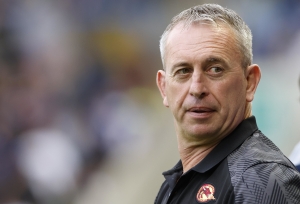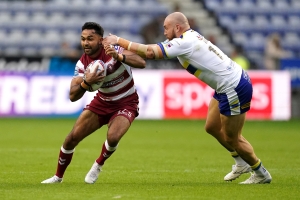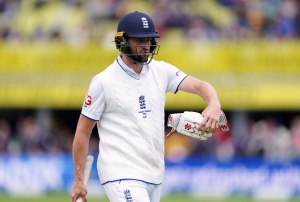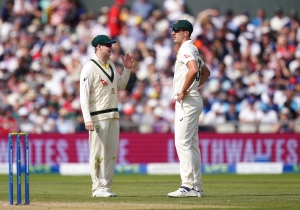Manchester United fans have flocked to Old Trafford to pay tribute to Sir Bobby Charlton following his death aged 86.
A book of condolence was opened at 10am on Sunday in the International Suite and supporters laid flowers and scarves and left messages for one of their most famous sons.
One read: “Thank you Sir Bobby, a hero to the worldwide football family,” while a message from fan group The 1958 said: “History, dignity and integrity is what you gave to our great club. Our promise to you is to make sure it stays.”
Charlton was a key member of England’s victorious 1966 World Cup team and also enjoyed great success at club level with United, who became the first English club to win the European Cup in 1968.
His family announced on Saturday afternoon that he had died peacefully in the early hours of the morning surrounded by his family.
United led the tributes, saying in a statement: “Manchester United are in mourning following the passing of Sir Bobby Charlton, one of the greatest and most beloved players in the history of our club.
“Sir Bobby was a hero to millions, not just in Manchester, or the United Kingdom, but wherever football is played around the world.
“He was admired as much for his sportsmanship and integrity as he was for his outstanding qualities as a footballer; Sir Bobby will always be remembered as a giant of the game.”
Charlton made his debut for United in 1956 and went on to play 758 matches for the Red Devils, scoring 249 goals. Both were long-standing club records until they were overtaken by Ryan Giggs and Wayne Rooney, respectively.
Charlton won three league three titles and one FA Cup at Old Trafford and, after leaving United in 1973 and becoming Preston manager, he returned to Old Trafford 11 years later as a club director. He was knighted for services to football in 1994.
The statement continued: “His unparalleled record of achievement, character and service will be forever etched in the history of Manchester United and English football; and his legacy will live on through the life-changing work of the Sir Bobby Charlton Foundation.
“The club’s heartfelt sympathies are with his wife Lady Norma, his daughters and grandchildren, and all who loved him.”
United manager Erik ten Hag described Charlton as “a legend” and “a giant” as he paid his own tribute after his side’s 2-1 win at Sheffield United on Saturday night.
A wreath was put in the centre circle as a minute’s applause was held before kick-off, while another wreath was laid at the base of the statue of Charlton, George Best and Denis Law in front of Old Trafford.
“His achievements are so immense and huge – global, not only England,” Ten Hag said.
“You see the facts he achieved are incredible. All the games, his titles, his trophies, the contribution he had with his goals.
“I never had the honour to meet him, but I heard, despite all his trophies and games, he was so humble. A big personality and an example for all of us as a footballer and also in society.”
Charlton’s European Cup success at United came 10 years after the Munich air disaster, which he and team manager Sir Matt Busby survived but which claimed the lives of eight of Charlton’s team-mates.
Born in Ashington on October 11 1937, Charlton played in the World Cup final alongside his brother Jack, who died aged 85 in 2020, and won 106 caps for England, scoring 49 goals.
Charlton was diagnosed with dementia and the announcement of his condition made public in November 2020, two days after his United and England team-mate Nobby Stiles died following his own battle with the illness.
The official England account on X, formerly known as Twitter, wrote: “It is with a heavy heart that we have learned of the passing of Sir Bobby Charlton.
“An integral part of our 1966 FIFA World Cup winning campaign, Sir Bobby won 106 caps and scored 49 times for the #ThreeLions.
“A true legend of our game. We will never forget you, Sir Bobby.”
Prince William, president of the Football Association, paid tribute to Charlton on social media.
Writing on the official account of The Prince and Princess of Wales, William said: “Sir Bobby Charlton. First Division Champion. European Champion. World Champion. Gentleman. Legend. A true great who will be remembered forever. Thank you Sir Bobby. W.”
England manager Gareth Southgate added: “One of our most iconic players, Sir Bobby Charlton’s impact on our only World Cup triumph is there for all to see.
“The privilege of meeting him on several occasions allowed me to understand his personal pride and emotion in having represented England and simply confirmed in my mind his standing as one of the gentlemen of the game.
“The world of football will unite in its sadness at losing an undisputed legend.”
A tribute to Charlton was shown on giant screens outside Wembley on Saturday night, while England will pay a full tribute at the European Championship qualifier against Malta at Wembley on November 17.
Charlton made his England debut against Scotland at Hampden Park in April 1958, just over two months after he had survived the Munich air disaster.
He was not selected for England’s 1958 World Cup squad that summer, but played at the tournament in 1962, 1966 and 1970.
Charlton scored three times at the 1966 World Cup, including both goals in the 2-1 semi-final victory over Portugal, and ended his England career at the age of 32 following the quarter-final exit to West Germany in 1970.
Wayne Rooney broke Charlton’s scoring records for both Manchester United and England and heard the news during the Sky Bet Championship match between Middlesbrough and Birmingham at the Riverside.
Birmingham boss Rooney said: “As I came out for the second half, I didn’t know what was happening. I see his image on the big screen and it hit me what had happened.
“Bobby was always great with me, we had many conversations about football and life. He is a huge inspiration not just to me but to a lot of players who have played for Manchester United.
“He was the first to congratulate me when I broke the record at Stoke. He came in after the game with his wife. He said congratulations – and a few more harsh words, jokingly.
“He was a top human being, which is more important.”
Middlesbrough manager Michael Carrick, another former United player, said: “One particular memory that stands out was the 50-year anniversary of Munich.
“He came into the training ground and spoke to us about the tragedy and what it meant to him. That’s 45 minutes that I will never, ever forget.”
Charlton’s death means Sir Geoff Hurst is the only survivor from England’s 1966 World Cup final win over West Germany.
Hurst, who hit a hat-trick in the 4-2 Wembley victory, said: “Very sad news today 1 of the true Greats Sir Bobby Charlton has passed away. We will never forget him & nor will all of football.
“A great colleague & friend he will be sorely missed by all of the country beyond sport alone. Condolences to his family & friends from Geoff and Judith.”
View this post on Instagram
A post shared by Marcus Rashford MBE (@marcusrashford)
England’s current record goalscorer, Harry Kane, told Sky Sports: “It’s a sad day for English football for sure. I send my love and condolences to his friends and family.
“Sir Bobby was one of England’s greatest ever players, if not the greatest. I’m proud that I was able to meet him.
“Obviously he was a big supporter of the national team, watching us whenever he could. A sad day but what a fantastic person, what a fantastic life he lived.”
Writing on Instagram following United’s win over Sheffield United, forward Marcus Rashford said: “I signed my first professional contract at Man Utd with Sir Bobby.
“Thank you for all the support and advice that you provided to me. That win was for you and your family.”










































